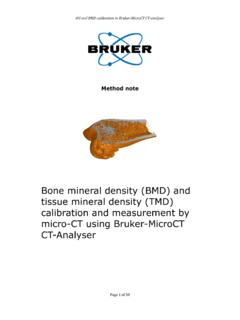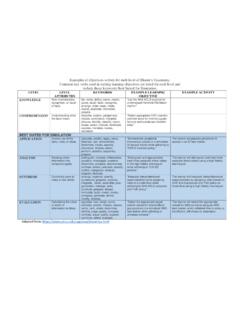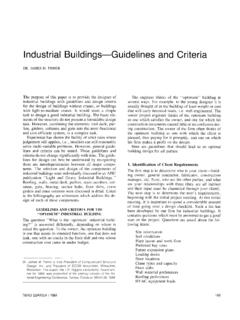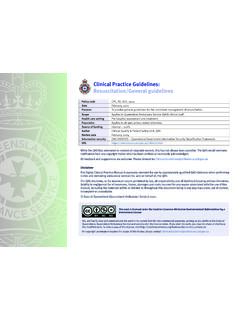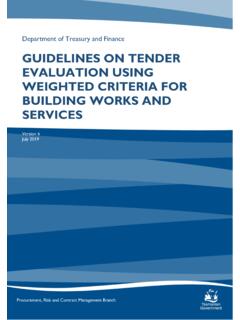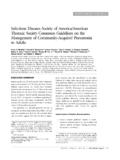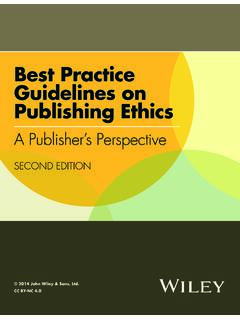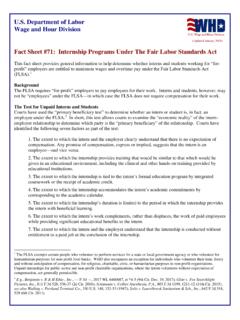Transcription of The Frazier Water Protocol - Temple University
1 The Free Water Protocol Development of the Protocol Founded at Frazier Rehabilitation Hospital in Kentucky in 1984. Speech pathologists on Frazier s dysphagia team became concerned by lack of compliance with patients on thickened liquids diets and resulting dehydration. Preparation of thick liquids at home can be burdensome, and is often abandoned after a few days or weeks. Availability and cost of thickening agents and/or prepackaged thick liquids may also inhibit compliance. Even when adequately hydrated, patients complained of thirst! Thickened liquids did not quench their thirsts. The Compliance Problem At Moss: Patients sneak Water at fountain, pantries, and from vases and saline bottles! Water pitchers sometimes end up on tray tables of patients on thick liquids Compliance Study in Literature: Compliance of geriatric dysphagia patients with safe swallowing instructions: Only 35% of patients were compliant with their safe swallowing techniques after just 5 days.
2 Note: all of these patients had normal cognitive function. Leiter & Windsor, Journal of Med. Speech-Language Path., 4: 289-299, (1996) Facts About Water The body is approximately 60% Water . Tap Water is a clear neutral ph and so it is compatible with other body fluids. Will not cause a chemical injury as might be expected with other liquids such as coffee, tea, or soda. If a drink of Water is aspirated, it will be absorbed by the lung mucosal tissues without harm. AND unlike an aspirated green bean or bite of chicken, Water will not obstruct the airway. Research Confirms: .. Aspiration of Water is a benign event.. Feinberg et al., Dysphagia, 5,(2): 61-71(1990) both normals during sleep and those with depressed consciousness aspirate during sleep. This aspiration does not result in pneumonia Huxley et al, Am J Med, 64(4):564-568, 1978 Research Confirms: Randomized control study to determine the effects of unlimited oral intake of Water in patients with identified aspiration.
3 Two small groups (n=10) of acute stroke patients (range 4-19 days post): the intervention group access to Water under supervision. Subjects had to pre-rinse and no Water was allowed within an hour of meals. There were no complications (dehydration,pneumonia) recorded for either the intervention or control groups, and the intervention group reported high satisfaction with access to Water . Interestingly, the intervention group continued to drink thickened liquids in addition to Water . Garon BR, Engle M and Ormiston, C, J Neuro Rehab,11:139- 148, (1997) The Dehydration Problem Many patients are on medications which cause them to dehydrate. They may have altered thirst perception. They may have cognitive and communication deficits and have difficulty either requesting Water or initiating drinking fluids Difficulty swallowing. Dislike of thickened liquids Dependent on others to offer fluids Impact of various types of thickener- some are starch-based and may lead to dehydration The Dehydration Problem oral intake of thickened fluids are hugely the use of supplemental enteral and parenteral fluids.
4 Whelan,K., Clin Nutr. Oct;20(5):423-8 (2001) Fluid intake declined over the 21 day on thickened liquid diets failed to meet their fluid requirements. Finestone et al;Arch Phys Med Rehabil 82:1744-6. (2001) Facts Dehydration can also lead to a variety of negative health conditions such as: Change in drug effects Altered cardiac function Lethargy Acute renal failure Constipation Weakness Infections Declining nutritional intake Poor wound healing Confusion Pressure sores UTI s Facts Water is an essential but overlooked nutrient. 8 glasses of Water a day is recommended for most people, that is approximately 2300ml per day. (1500 ml by liquids only) A well hydrated male must consume at least 2,900 ml of fluid per day. Adult females at least 2,200 ml per day. These should be in the form of non-caffeinated, nonalcoholic, beverages, soups and foods. A portion of the population is chronically dehydrated.
5 Kleiner SM, J AM Diet Assoc., 4, 411, (1999) Facts Prepared thickened drinks are often only 4oz. servings. This almost guarantees patients will be offered less than they need. Most of our patients cannot get a drink for themselves. Drinking the recommended amount of liquids may be difficult if you are on a honey or nectar thick liquid Dehydration among nursing home patients is under diagnosed and reported Quality of Life When recommending an altered diet, clinicians always consider the patient s quality of life. It can be a challenge to balance this with safety, hydration and nutrition needs. Patient s and caregivers often express concern that long-term orders for thickened liquids or tube feedings without an option for Water or ice chips denies a very primitive and basic drive to refresh the senses. The Free Water Protocol offers a possible solution to the dilemma of keeping our patient s safety and health top priority and adding to the quality of life and satisfaction at the same time.
6 And hopefully, patients will be less likely to drink other thin liquids if they are successfully hydrated with Water . How the Protocol Works The Protocol The speech-language pathologist will determine patient candidacy for this Protocol and will obtain physician orders. A video swallow study may be completed to determine the nature and degree of aspiration and the effectiveness of strategies in minimizing aspiration. Once the order is written the SLP will inform the primary nurse and place an orange wristband to indicate that the patient is on the Protocol . The orange band means that the patient is on thin liquid restrictions, but may have Water following the rules of the Protocol . A sign will also be placed at bedside. The Protocol Nursing will document in the plan of care. Patients on thickened liquids who are not appropriate for free Water will not wear wristbands. Notification of diet/liquid status will continue as Follow the information on the Dysphagia Guidelines card on the back of the patient s chair.
7 All staff should diligently check and be familiar with the swallow guidelines for a patient before giving them any food/liquid to take by mouth. Water Rules Patients on thickened liquids are allowed to have Water between meals. However, this will be decided on a case by case basis at the discretion of the Speech-Language Pathologist. These patients should be offered Water throughout the day. Ice chips may also be given with supervision Water Rules Patients for whom compensations, chin tuck head turn, etc. have proven effective will continue to use these compensatory techniques when drinking Water . Continue to use the guidelines and strategies that are posted by the Speech-Language Pathologist located on the Dysphagia Guidelines card on the back of the patient s chair. Water Rules NO Water is allowed during meals or for 30 minutes after a meal. For patients on oral diets, Water is permitted between meals only.
8 Water intake is unrestricted prior to a meal and allowed 30 minutes after a meal. The period of time following the meal allows spontaneous swallows and gravity to clear pooled solid or thickened liquid residues. Thickened liquids are to be used during meals as recommended Medication Rules Pills are NOT given with Water . Pills are never given with Water due to risk of aspiration of a pill into the airway. Instead pills are given in a teaspoon of: Applesauce Yogurt Pudding Thickened liquids Thin liquid medications should be changed to pill form or a thickening agent added when approved by the physician and or pharmacist. Family Education Family education is a vital part of the free Water Protocol Family education will emphasize the rationale for allowing Water intake. The Speech-Language Pathologist, dietitian, and nursing staff should each review the guidelines for Water intake during the education process.
9 Written material may be provided as well. criteria for Inclusion Patients are NPO or currently taking honey or nectar thick liquids Patients are able to swallow Water without demonstrating excessive coughing and discomfort. Patients are able to maintain alertness and arousal. Patients are able to elicit a timely/efficient swallow (determined by SLP) Patients are able to maintain upright posture criteria for Exclusion Fragile patients with acute pulmonary disorders or a history of recurrent aspiration pneumonia will not be included. Patients who are unable to get out of bed consistently will not be candidates. Patients with a fever of unknown origin will be excluded. Patients with thrush will be excluded until adequate treatment and resolution Why is oral hygiene necessary? Why is oral hygiene necessary? Bacterial flora increases and is altered by disease,malnutrition, dehydration, xerostomia,over use of antibiotics, and most importantly, dental and periodontal disease.
10 Why is oral hygiene necessary? ..aspiration [of oropharyngeal organisms] is believed to be the most important [route] for both nosocomial and community-acquired pneumonia (CDC, 1997) Why is oral hygiene necessary? Aspiration of oropharyngeal pathogens is the dominant cause of nursing home acquired pneumonia. And poor oral health strongly correlates with an increased risk of developing aspiration pneumonia. Why is oral hygiene necessary? Aspiration is a multifactorial event. Only 38% of known aspirators developed pneumonia ..dysphagia and aspiration are necessary, but not sufficient conditions for development of pneumonia. Other risk factors must be present as well Dysphagia and aspiration were not risk factors in and of themselves Langmore, S. et al, Dysphagia (1998) Why is oral hygiene necessary? Dominant Risk Factors #1 dependent on others for feeding {41%} #2 dependent on others for oral care {40%} #3 number of decayed or missing teeth and low frequency of brushing{34%} Why is oral hygiene necessary?
![transition to retirement TUSM-FINALrev02-17-10[1]](/cache/preview/2/0/8/1/d/3/1/7/thumb-2081d317aceb3fadbe14f98091ebcdcd.jpg)
